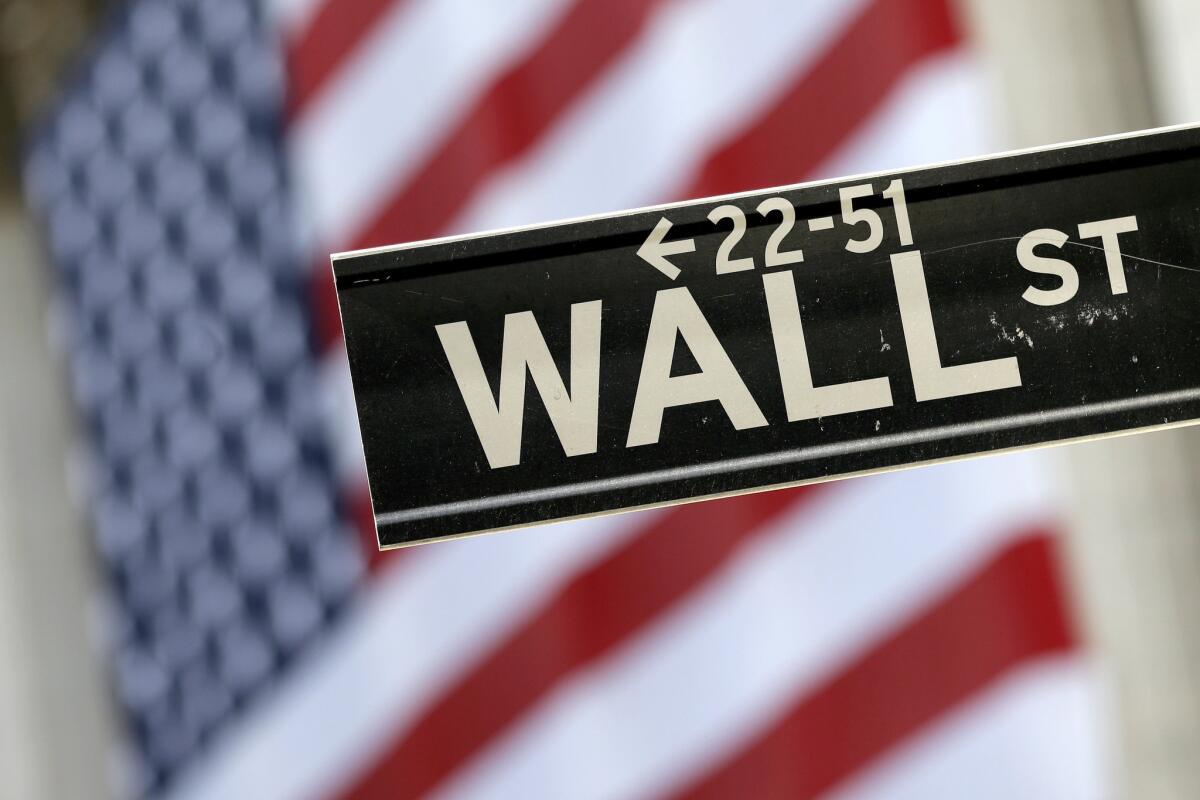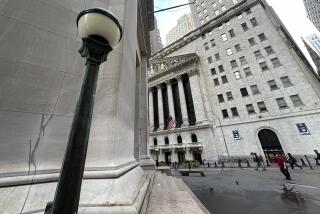Wall Street rebounds after yet another yo-yo day of trading

- Share via
Wall Street rebounded on Tuesday, and the S&P 500 more than made up all its losses from the day before, after stocks pinballed through another day of erratic trading.
The S&P 500 climbed 1.3%, led by energy producers and other companies whose profits would benefit greatly from a strengthening economy. It was a sharp turnaround from the morning, when the index was down 0.9%, and from Monday’s last-hour slide after California shut bars and reinstated other restrictions amid a jump in coronavirus counts.
The Dow Jones industrial average also erased an early loss to end the day at 26,642.59, up 556.79 points, or 2.1%. Big tech-oriented stocks lagged behind, though, in a turnaround from their remarkably resilient run through the pandemic. That held the Nasdaq composite to a more modest gain of 97.73, or 0.9%, to 10,488.58.
The S&P 500 added 42.30 points to 3,197.52, and 6 out of 7 stocks in the index were higher. The move left it 0.4% higher for the week after two yo-yo days.
After the market closed, shares of Moderna jumped in after-hours trading after a COVID-19 vaccine it’s developing with the National Institutes of Health revved up people’s immune systems just the way scientists had hoped. The experimental vaccine will start its most important step around July 27: a 30,000-person study to prove if the shots are strong enough to protect against the disease.
Tuesday’s unsettled market moves came as earnings reporting season kicked off. Three of the nation’s biggest banks painted a mixed picture of how badly the pandemic is ripping through their businesses.
Like the broader market, financial stocks drifted between gains and losses for much of the day before turning higher in the afternoon. JPMorgan Chase, Wells Fargo and Citigroup said they collectively set aside nearly $27 billion during the second quarter to cover loans potentially going bad due to the recession.
But investors took very different approaches to each of them. JPMorgan Chase rose 0.6% after it said it made a record amount of revenue from April through June. Its profit for the latest quarter also beat analysts’ forecasts, even though it was roughly half of what it was a year ago.
Wells Fargo, though, dropped 4.6% after it said it expects to cut its dividend. “Our view of the length and severity of the economic downturn has deteriorated considerably,” Chief Executive Charlie Scharf said.
Citigroup fell 3.9% after CEO Michael Corbat said its overall business performance was strong last quarter, though net income dropped 73% from a year ago largely due to the $7.9 billion it set aside for loans potentially going bad.
Delta Air Lines lost 2.6% after its earnings and revenue for the latest quarter fell short of Wall Street’s already very low expectations. The pandemic is keeping fliers on the ground, and Delta’s passenger count plunged 93% during the quarter from a year earlier. CEO Ed Bastian said it could be two years before the airline sees a sustainable recovery.
Stocks have been mostly churning in place since early June. That’s when the S&P 500 pulled back within 4.5% of its record high set in February, after earlier being down nearly 34%. The index is now 5.6% below its record.
Pulling stocks higher has been a budding economic recovery, with the job market, retail sales and other measures of the economy halting their plunge and beginning to resume growth. Underlying it all is massive aid for the economy from central banks and governments around the world.
But pushing stocks down are accelerating coronavirus counts in hot spots around the world, which threatens to halt the recovery just as it got going. California demonstrated on Monday how dangerous that can be when the governor of the country’s largest state economy ordered indoor dining and other economic activity closed.
The worry is that the continuing pandemic could push states across the Sun Belt to roll back reopenings of their economies.
In Europe, France’s CAC 40 fell 1%, and Germany’s DAX lost 0.8%. The FTSE 100 in London added 0.1%.
In Asia, Japan’s Nikkei 225 fell 0.9%, South Korea’s Kospi slipped 0.1% and Hong Kong’s Hang Seng dropped 1.1%.
The yield on the 10-year Treasury held at 0.62% after rallying back from a morning dip to 0.60%. It tends to move with investors’ expectations of the economy and inflation.
Benchmark U.S. crude oil rose 19 cents to settle at $40.29 per barrel. Brent oil, the international standard, rose 18 cents to $42.90 a barrel.
More to Read
Inside the business of entertainment
The Wide Shot brings you news, analysis and insights on everything from streaming wars to production — and what it all means for the future.
You may occasionally receive promotional content from the Los Angeles Times.










